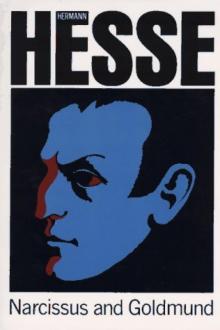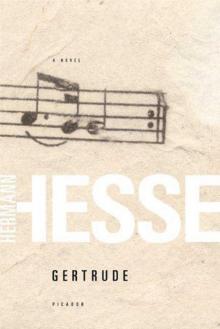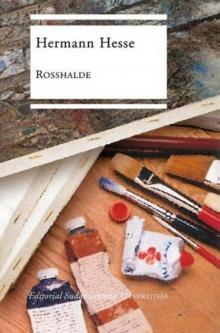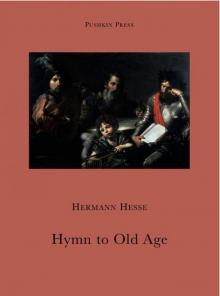- Home
- Hermann Hesse
The Glass Bead Game Page 9
The Glass Bead Game Read online
Page 9
Knecht's departure from Eschholz marked the end of an era in his life. If hitherto he had lived a happy childhood, in a willing subordination and harmony almost without problems, there now began a period of struggle, development, and complex difficulties. He was about seventeen years old when he was informed of his impending transfer. A number of his classmates received the same announcement, and for a short while there was no more important question among the elect, and none more discussed, than the place to which each of them would be transplanted. In keeping with tradition, they were told only a few days before their departure, and between the graduation ceremony and departure there were several days of vacation.
During this vacation something splendid happened to Knecht. The Music Master proposed he take a walking trip and visit him, spending a few days as his guest. That was a great and rare honor. Early one morning Knecht set out with a fellow graduate--for he was still considered an Eschholz pupil, and at this level boys were not allowed to travel alone. They tramped toward the forest and the mountains, and when after three hours of steady climbing through shady woods they reached a treeless summit, they saw far below them, already small and easy to grasp as a whole, their Eschholz, recognizable even at this distance by the dark mass of the five giant trees, the quadrangle with its segments of lawn and sparkling pools, the tall schoolhouse, the service buildings, the village, the famous grove of ash trees from which the school took its name. The two youths stood still, looking down. A good many of us cherish the memory of this lovely view; it was then not very different from the way it looks today, for the buildings were rebuilt after the great fire, and three of the five tall trees survived the blaze. They saw their school lying below them, their home for many years, to which they would soon be bidding good-by, and both of them felt their hearts contract at the sight.
"I think I've never before really seen how beautiful it is," Joseph's companion said. "But I suppose it's because I'm seeing it for the first time as something I must leave and say farewell to."
"That's exactly it," Knecht said. "You're right, I feel the same way. But even though we are going away, we won't after all be leaving Eschholz. Only the ones who have gone away forever have really left it, like Otto, for instance, who could make up such funny bits of Latin doggerel, or Charlemagne, who could swim so long under water, and the others. They really said farewell and broke away. It's a long time since I've thought about them, but now they come back to me. Laugh at me if you like, but in spite of everything there's something impressive to me about those apostates, just as there is a grandeur about the fallen angel Lucifer. Perhaps they did the wrong thing, or rather, undoubtedly they did the wrong thing, but all the same they did something, accomplished something; they ventured a leap, and that took courage. We others have been hardworking and patient and reasonable, but we haven't done anything, we haven't taken any leaps."
"I don't know," his companion said. "Many of them neither did anything nor ventured anything; they simply fooled around until they were dismissed. But maybe I don't quite understand you. What do you mean about leaping?"
"I mean being able to take a plunge, to take things seriously, to--well, that's just it, to leap. I wouldn't want to leap back to my former home and my former life; it doesn't attract me and I've almost forgotten it. But I do wish that if ever the time comes and it proves to be necessary, that I too will be able to free myself and leap, only not backward into something inferior, but forward and into something higher."
"Well, that is what we are headed for. Eschholz was one step; the next will be higher, and finally the Order awaits us."
"Yes, but that isn't what I meant. Let's move on, amice; walking is so great, it will cheer me up again. We've really given ourselves a case of the dumps."
This mood and those words, which his classmate recorded, already sound the note which prevailed during the stormy period of Knecht's adolescence.
The hikers tramped for two days before they reached the Music Master's current home, Monteport, high in the mountains, where the Master lived in the former monastery, giving a course for conductors. Knecht's classmate was lodged in the guest house, while Knecht himself was assigned a small cell in the Magister's apartment. He had barely unpacked his knapsack and washed when his host came in. The venerable man shook hands with the boy, sat down with a small sigh, and for a few minutes closed his eyes, as was his habit when he was very tired. Then, looking up with a friendly smile, he said: "Forgive me; I am not a very good host. You have just come from a long hike and must be tired, and to tell the truth so am I--my day is somewhat overcrowded--but if you are not yet ready for bed, I should like to have an hour with you in my study. You will be staying here two days, and tomorrow both you and your classmate will be dining with me, but unfortunately my time is so limited, and we must somehow manage to save the few hours I need for you. So shall we begin right away?"
He led Knecht into a large vaulted cell empty of furniture but for an old piano and two chairs. They sat down in the chairs.
"You will soon be entering another stage," the Master said. "There you will learn all sorts of new things, some of them very pleasant. Probably you'll also begin dabbling in the Glass Bead Game before long. All that is very fine and important, but one thing is more important than anything else: you are going to learn meditation there. Supposedly all the students learn it, but one can't go checking up on them. I want you to learn it properly and well, just as well as music; then everything else will follow of its own accord. Therefore I'd like to give you the first two or three lessons myself; that was the purpose of my invitation. So today and tomorrow and the day after tomorrow let us try to meditate for an hour each day, and moreover on music. You will be given a glass of milk now, so that hunger and thirst do not disturb you; supper will be brought to us later."
He rapped on the door, and a glass of milk was brought in.
"Drink slowly, slowly," he admonished. "Take your time, and do not speak."
Knecht drank his cool milk very slowly. Opposite him, the dear man sat with his eyes closed again. His face looked very old, but friendly; it was full of peace, and he was smiling to himself, as though he had stepped down into his own thoughts like a tired man into a footbath. Tranquility streamed from him. Knecht felt it, and himself grew calmer.
Now the Magister turned on his chair and placed his hands on the piano. He played a theme, and carried it forward with variations; it seemed to be a piece by some Italian master. He instructed his guest to imagine the progress of the music as a dance, a continuous series of balancing exercises, a succession of smaller or larger steps from the middle of an axis of symmetry, and to focus his mind entirely on the figure which these steps formed. He played the bars once more, silently reflected on them, played them again, then sat quite still, hands on his knees, eyes half closed, without the slightest movement, repeating and contemplating the music within himself. His pupil, too, listened within himself, saw fragments of lines of notes before him, saw something moving, something stepping, dancing, and hovering, and tried to perceive and read the movement as if it were the curves in the line of a bird's flight. The pattern grew confused and he lost it; he had to begin over again; for a moment his concentration left him and he was in a void. He looked around and saw the Master's still, abstracted face floating palely in the twilight, found his way back again to that mental space he had drifted out of. He heard the music sounding in it again, saw it striding along, saw it inscribing the line of its movement, and followed in his mind the dancing feet of the invisible dancers....
It seemed to him that a long time had passed before he glided out of that space once more, again became aware of the chair he sat on, the mat-covered stone floor, the dimmer dusk outside the windows. He felt someone regarding him, looked up and into the eyes of the Music Master, who was attentively studying him. The Master gave him an almost imperceptible nod, with one finger played pianissimo the last variation of the Italian piece, and stood up.
"Stay on," he said. "I shall be back. Tr
y once again to track down the music; pay attention to the figure. But don't force yourself; it's only a game. If you should fall asleep over it, there's no harm."
He left; there was still a task awaiting him, left over from the overcrowded day. It was no easy and pleasant task, none that he would have wished for. One of the students in the conducting course was a gifted but vain and overbearing person. The Music Master would have to speak to him now, curbing his bad habits, showing him his faults, all this with an even balance of solicitude and superiority, love and authority. He sighed. What a pity that no arrangements were ever final, that recognized errors were never eliminated for good, that again and again the selfsame failings had to be combated, the selfsame weeds plucked out. Talent without character, virtuosity without values, had dominated musical life in the Age of the Feuilleton, had been extirpated during the musical Renaissance--and here was that same spirit again, making vigorous growth.
When he returned from his errand to have supper with Joseph, he found the boy sitting still, but contented and no longer tired in the least. "It was beautiful," Joseph said dreamily. "While it was going on, the music vanished completely; it changed."
"Let it reverberate inside you," the Master said, leading him into a small chamber where a table was set with bread and fruit. They ate, and the Master invited him to sit in on the conducting course for a while in the morning. Just before showing his guest to his cell and retiring for the night, he said: "During your meditation you saw something; the music appeared to you as a figure. If you feel so minded, try to copy it down."
In the guest cell Knecht found pencils and paper on the table, and before he went to bed he tried to draw the figure which the music had assumed for him. He drew a line, and moving diagonally off from the line at rhythmic intervals short tributary lines. It looked something like the arrangement of leaves on the twig of a tree. What he had produced did not satisfy him, but he felt impelled to try it again and yet again. At last he playfully curved the line into a circle from which the tributary lines radiated, like flowers in a garland. Then he went to bed and fell asleep quickly. He dreamed that he was once again on that height above the woods, where he had rested with his classmate, and saw dear Eschholz spread out below him. And as he looked down, the quadrangle of the school building contracted into an oval and then spread out to a circle, a garland, and the garland began turning slowly; it turned with increasing speed, until at last it was whirling madly and burst, flying apart into twinkling stars.
He had forgotten this dream by the time he awoke. But later, during a morning walk, the Master asked him whether he had dreamt, and it seemed to him that he must have had an unpleasant experience in his dreams. He thought, recovered the dream, told it, and was astonished at how innocuous it sounded. The Master listened closely.
"Should we be mindful of dreams?" Joseph asked. "Can we interpret them?"
The Master looked into his eyes and said tersely: "We should be mindful of everything, for we can interpret everything."
After they had walked on a bit, he asked paternally: "Which school would you most like to enter?"
Joseph flushed. He murmured quickly: "Waldzell, I think!"
The Master nodded. "I thought so. Of course you know the old saying: 'Gignit autem artificiosam'..."
Still blushing, Joseph completed the saying familiar to every student: "Gignit autem artificiosam lusorum gentem Cella Silvestris": "But Waldzell breeds the skillful Glass Bead Game players."
The old man gave him a warm look. "Probably that is your path, Joseph. As you well know, there are some who do not think well of the Glass Bead Game. They say it is a substitute for the arts, and that the players are mere popularizers; that they can no longer be regarded as truly devoted to the things of the mind, but are merely artistic dilettantes given to improvisation and feckless fancy. You will see how much or how little truth there is in that. Perhaps you yourself have notions about the Glass Bead Game, expecting more of it than it will give you, or perhaps the reverse. There is no doubt that the Game has its dangers. For that very reason we love it; only the weak are sent out on paths without perils. But never forget what I have told you so often: our mission is to recognize contraries for what they are: first of all as contraries, but then as opposite poles of a unity. Such is the nature of the Glass Bead Game. The artistically inclined delight in the Game because it provides opportunities for improvisation and fantasy. The strict scholars and scientists despise it--and so do some musicians also--because, they say, it lacks that degree of strictness which their specialties can achieve. Well and good, you will encounter these antinomies, and in time you will discover that they are subjective, not objective--that, for example, a fancy-free artist avoids pure mathematics or logic not because he understands them and could say something about them if he wished, but because he instinctively inclines toward other things. Such instinctive and violent inclinations and disinclinations are signs by which you can recognize the pettier souls. In great souls and superior minds, these passions are not found. Each of us is merely one human being, merely an experiment, a way station. But each of us should be on the way toward perfection, should be striving to reach the center, not the periphery. Remember this: one can be a strict logician or grammarian, and at the same time full of imagination and music. One can be a musician or Glass Bead Game player and at the same time wholly devoted to rule and order. The kind of person we want to develop, the kind of person we aim to become, would at any time be able to exchange his discipline or art for any other. He would infuse the Glass Bead Game with crystalline logic, and grammar with creative imagination. That is how we ought to be. We should be so constituted that we can at any time be placed in a different position without offering resistance or losing our heads."
"I think I understand," Joseph said. "But are not those who have such strong preferences and aversions simply more passionate natures, others just more sober and temperate?"
"That seems to be true and yet it is not," the Master replied, laughing. "To be capable of everything and do justice to everything, one certainly does not need less spiritual force and elan and warmth, but more. What you call passion is not spiritual force, but friction between the soul and the outside world. Where passion dominates, that does not signify the presence of greater desire and ambition, but rather the misdirection of these qualities toward an isolated and false goal, with a consequent tension and sultriness in the atmosphere. Those who direct the maximum force of their desires toward the center, toward true being, toward perfection, seem quieter than the passionate souls because the flame of their fervor cannot always be seen. In argument, for example, they will not shout and wave their arms. But I assure you, they are nevertheless burning with subdued fires."
"Oh, if only it were possible to find understanding," Joseph exclaimed. "If only there were a dogma to believe in. Everything is contradictory, everything tangential; there are no certainties anywhere. Everything can be interpreted one way and then again interpreted in the opposite sense. The whole of world history can be explained as development and progress and can also be seen as nothing but decadence and meaninglessness. Isn't there any truth? Is there no real and valid doctrine?"
The Master had never heard him speak so fervently. He walked on in silence for a little, then said: "There is truth, my boy. But the doctrine you desire, absolute, perfect dogma that alone provides wisdom, does not exist. Nor should you long for a perfect doctrine, my friend. Rather, you should long for the perfection of yourself. The deity is within you, not in ideas and books. Truth is lived, not taught. Be prepared for conflicts, Joseph Knecht--I can see they have already begun."
During those few days Joseph for the first time saw his beloved Magister in his everyday life and work, and he felt intense admiration, although only a small part of what the Music Master accomplished every day came into view. But most of all the Master won his heart by taking such an interest in him, by having invited him, and by managing to spare hours for him despite his being often so ove
rworked and overtired. Nor was it only the lessons. If this introduction to meditation made so deep and lasting an impression upon him, it did so, as he later learned to appreciate, not because the Master's technique was so especially subtle and unique, but only because of the Master's personality and example. His later teachers, who instructed him in meditation during the following year, gave him more guidance, more precise lessons; they controlled results more closely, asked more questions, managed to do more correcting. The Music Master, confident of his power over this young man, did very little teaching and talking. Mostly, he merely set themes and showed the way by example. Knecht observed the way the Master often looked so old and worn out, but after sinking into himself with half-closed eyes he would once again manage to look so tranquil, vigorous, cheerful, and friendly. To Joseph this renewal was a persuasive demonstration of the right way to the true springs, the way from restiveness to peace. Whatever the Master had to say about this matter was casually imparted to Knecht on brief walks or at meals.
We know also that at this time the Magister gave Knecht some first hints and suggestions about the Glass Bead Game, but none of his actual words have been preserved. Joseph was also struck by the fact that the Master took some trouble with Joseph's companion, so that the boy would not feel he was only a hanger-on. The old man seemed to think of everything.
The brief stay in Monteport, the three lessons in meditation, attendance at the course for conductors, the few talks with the Master, meant a great deal to Joseph Knecht. There was no question but that the Master had found the most effective time for interposing briefly in Knecht's life. The chief purpose of his invitation, as he had said, had been to commend meditation to Joseph; but this invitation had been no less important in itself, as a distinction and a token that he was well thought of, that his superiors expected something of him. It was the second stage of vocation. He had been granted some insight into the inner spheres. If one of the twelve Masters summoned a pupil at his level to come so close, that was not just an act of personal benevolence. What a Master did was always more than personal.

 Beneath the Wheel
Beneath the Wheel Strange News From Another Star
Strange News From Another Star Narcissus and Goldmund
Narcissus and Goldmund Steppenwolf
Steppenwolf Siddhartha
Siddhartha Demian
Demian Knulp
Knulp Gertrude
Gertrude Rosshalde
Rosshalde The Glass Bead Game
The Glass Bead Game The Journey to the East
The Journey to the East Klingsor's Last Summer
Klingsor's Last Summer Hymn to Old Age
Hymn to Old Age Poems
Poems The Fairy Tales of Hermann Hesse
The Fairy Tales of Hermann Hesse Singapore Dream and Other Adventures
Singapore Dream and Other Adventures Soul of the Age
Soul of the Age